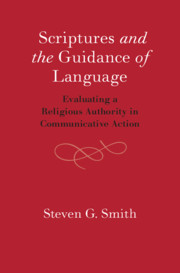Book contents
- Scriptures and the Guidance of Language
- Scriptures and the Guidance of Language
- Copyright page
- Contents
- Acknowledgments
- Part I Problematics of Communicative Action
- Part II Problematics of Scripture
- 5 What Is Scripture?
- 6 Evaluating the Scripture Premise
- 7 The Scripturalist
- 8 Multiscripturalism
- Concluding Thoughts on the Necessity of Guidance and Ideal Scripturalism
- Bibliography
- Index
7 - The Scripturalist
from Part II - Problematics of Scripture
Published online by Cambridge University Press: 05 October 2018
- Scriptures and the Guidance of Language
- Scriptures and the Guidance of Language
- Copyright page
- Contents
- Acknowledgments
- Part I Problematics of Communicative Action
- Part II Problematics of Scripture
- 5 What Is Scripture?
- 6 Evaluating the Scripture Premise
- 7 The Scripturalist
- 8 Multiscripturalism
- Concluding Thoughts on the Necessity of Guidance and Ideal Scripturalism
- Bibliography
- Index
Summary
- Type
- Chapter
- Information
- Scriptures and the Guidance of LanguageEvaluating a Religious Authority in Communicative Action, pp. 235 - 265Publisher: Cambridge University PressPrint publication year: 2018

